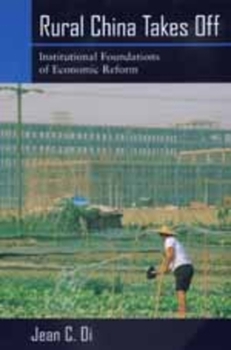Rural China Takes Off: Institutional Foundations of Economic Reform
Select Format
Select Condition 
Book Overview
In this incisive analysis of one of the most spectacular economic breakthroughs in the Deng era, Jean C. Oi shows how and why Chinese rural-based industry has become the fastest growing economic sector not just in China but in the world. Oi argues that decollectivization and fiscal decentralization provided party officials of the localities-counties, townships, and villages-with the incentives to act as entrepreneurs and to promote rural industrialization in many areas of the Chinese countryside. As a result, the corporatism practiced by local officials has become effective enough to challenge the centrality of the national state.
Dealing not only with the political setting of rural industrial development, Oi's original and strongly argued study also makes a broader contribution to conceptualizations of corporatism in political theory. Oi writes provocatively about property rights and principal-agent relationships and shows the complex financial incentives that underpin and strengthen the growth in local state corporatism and shape its evolution. This book will be essential for those interested in Chinese politics, comparative politics, and communist and post-communist systems.
Dealing not only with the political setting of rural industrial development, Oi's original and strongly argued study also makes a broader contribution to conceptualizations of corporatism in political theory. Oi writes provocatively about property rights and principal-agent relationships and shows the complex financial incentives that underpin and strengthen the growth in local state corporatism and shape its evolution. This book will be essential for those interested in Chinese politics, comparative politics, and communist and post-communist systems.
Format:Paperback
Language:English
ISBN:0520217276
ISBN13:9780520217270
Release Date:May 1999
Publisher:University of California Press
Length:259 Pages
Weight:0.53 lbs.
Dimensions:0.7" x 6.0" x 9.1"
Customer Reviews
1 rating
China's rural industrial miracle
Published by Thriftbooks.com User , 24 years ago
In the 1990s, Dr. Oi wrote several journal articles detailing the crucial role of the local state in post-Mao China's economic development. This book is a long version based on her extensive field research. China's explosive growth of rural industry raises considerable doubt about conventional wisdoms on property rights. Because these factories were collectively owned, they should have had all kinds of incentive problems. Yet, they were the engine of China's unusually rapid rural development from the mid-1970s through the mid-1990s. Dr. Oi explains how they accomplished this. In the late 1990s, the overinvested TVE sector stalled and contracted, with many firms subsequently privatized to managers, which Dr. Oi discusses briefly in this work and expands on in the volume she co-edited _Property Rights and Economic Reform_. The causes and methods of privatization of TVEs is complex and has resulted in much academic literature, of which Susan Whiting's _Power and Wealth in Rural China: The Political Economy of Institutional Change_ was an early example. People in development agencies should take notice of Oi's book, because the history of local state corporatism and community ownership of firms in the first 20 years of the reform era has important lessons for both growth and distribution.





